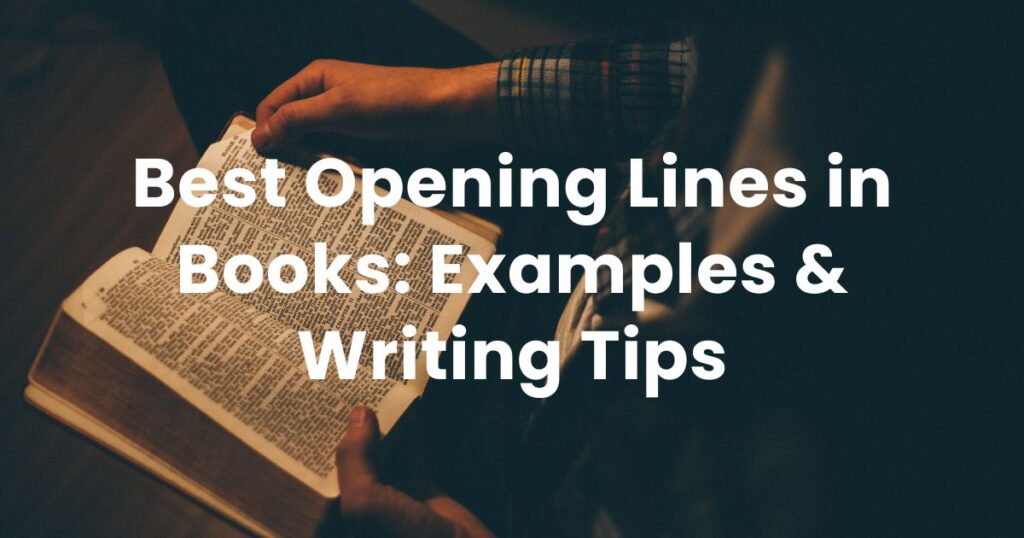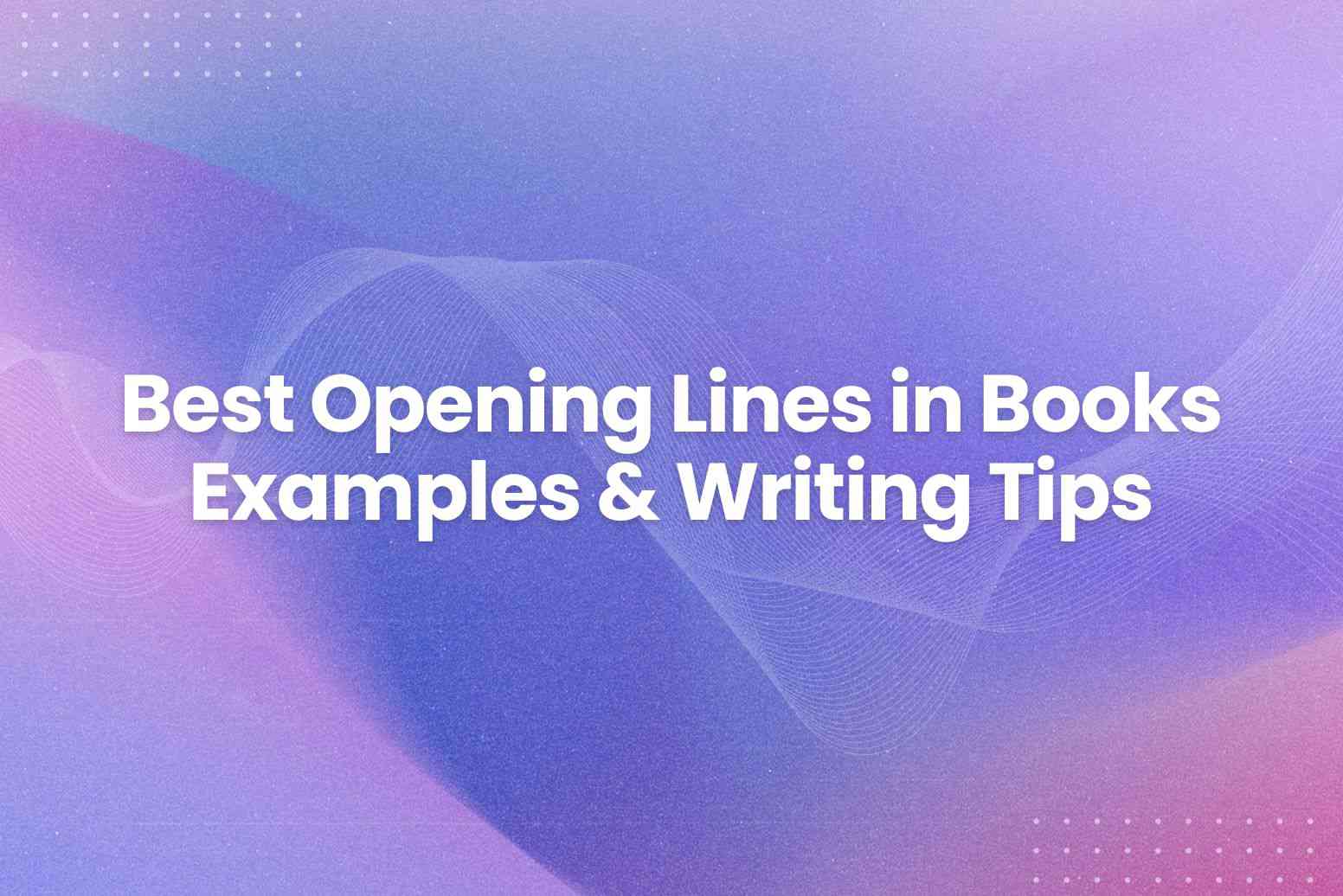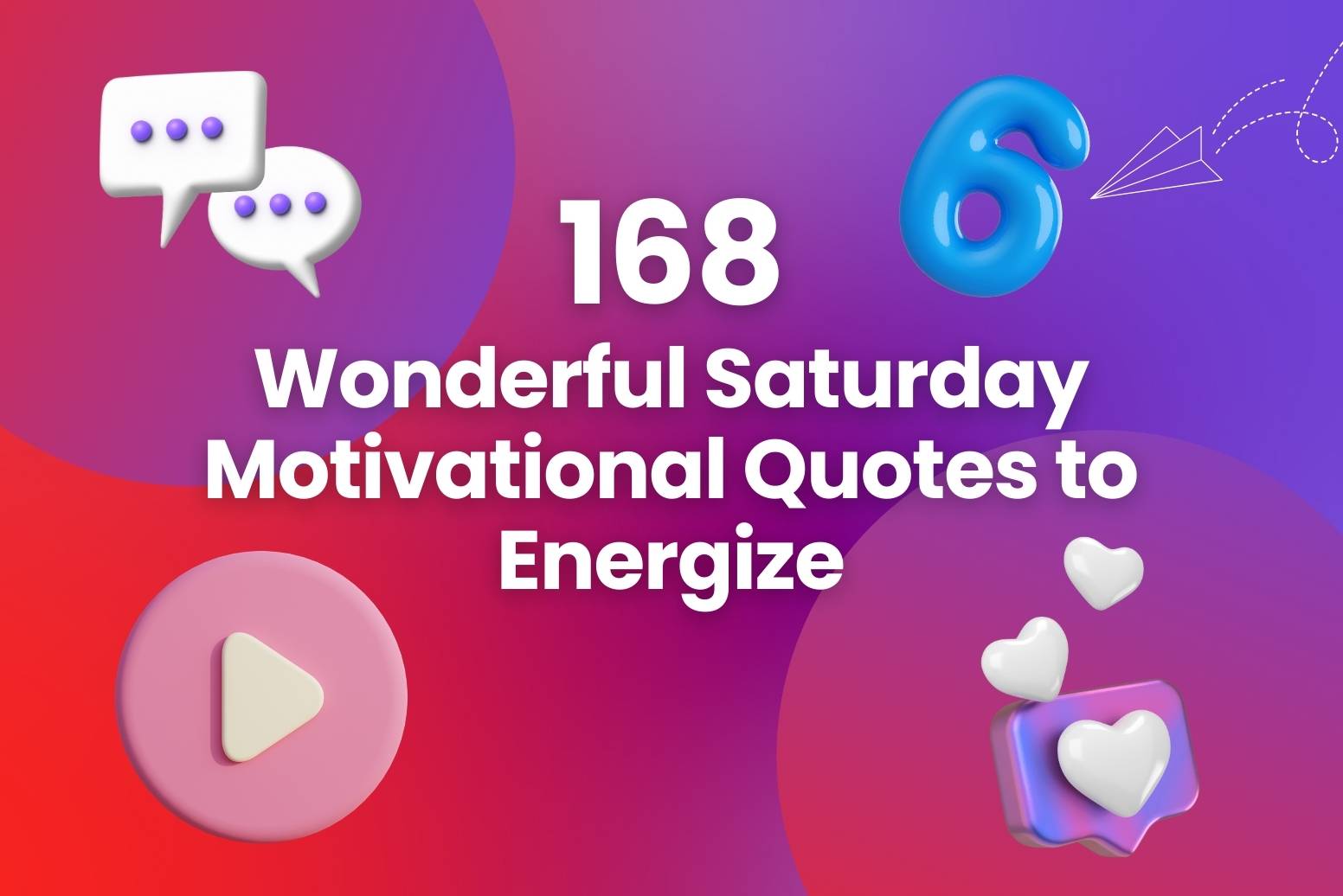A great opening line takes the first step in a book’s direction. Opening lines cast an immediate spell, grab your attention like a starter’s gun, set the tone and even foreshadow what is to come. A great first line can be nearly as important as everything that comes after. Like a captivating cover, it invites the reader in, stoking their curiosity and setting the tone for the rest of the story. Thus, we’ve collected some of the best opening lines in books and explore what makes them unforgettable.
As you reflect on the magic of best opening lines in books, why not harness the power of Arvin, your AI assistant? You can ask Arvin for analyses of specific opening lines, themes, or authors. Just tell Arvin what you want to find and explore deeper into the meaning behind your favorite books and uncover what makes certain lines resonate.
If you’re an aspiring writer, seek Arvin’s advice on crafting best opening lines in books for your own stories. Get tips on how to hook readers from the very first sentence!

Why A Great Opening Line in Books is Important
1. Captures Attention
The opening line is the first impression a reader has of a book. A compelling line grabs attention immediately, piquing curiosity and encouraging readers to keep turning the pages. In an age of information overload, where readers are bombarded with choices, a captivating opening is essential to stand out.
2. Sets the Tone
A well-crafted opening line establishes the tone and mood of the story. Whether it’s whimsical, dramatic, or mysterious, the tone guides the reader’s expectations and emotions. This initial atmosphere gives readers a sense of what type of experience they can anticipate throughout the narrative.
3. Introduces Key Themes
Often, a great opening line foreshadows major themes, concepts, or conflicts that will be explored within the book. It can hint at character relationships, social issues, or the overarching message the author intends to convey. This thematic grounding helps readers frame their understanding of the story as they progress.
4. Engages Character and Setting
The opening line can introduce the protagonist, provide context for the setting, or highlight a pivotal moment. This immediate engagement with characters and environments invites readers into the narrative world, fostering a connection that makes them more invested in the characters’ journeys and experiences.
The Best Opening Lines in Books
1. “Call me Ishmael.” — Moby-Dick by Herman Melville
This simple yet iconic line immediately establishes a conversational intimacy. It introduces the narrator in a straightforward manner while hinting at the epics of whaling and adventure to come. The name “Ishmael” resonates with themes of wandering and alienation, which permeate the narrative.
2. “It was the best of times, it was the worst of times…” — A Tale of Two Cities by Charles Dickens
With this famous opening, Dickens encapsulates the paradoxes of the period, inviting readers into a world of contrasts. This line not only signals the duality of the story but also establishes an epic scale, hinting at the historical events that will unfold.
3. “All happy families are alike; each unhappy family is unhappy in its own way.” — Anna Karenina by Leo Tolstoy
This line is profound in its simplicity and complexity. It sets the stage for a deep exploration of family dynamics and relationships, while also foreshadowing the tumultuous nature of the characters’ lives. Tolstoy’s opening invites readers to contemplate the nature of happiness and sorrow.
4. “In my younger and more vulnerable years my father gave me some advice that I’ve been turning over in my mind ever since.” — The Great Gatsby by F. Scott Fitzgerald
Fitzgerald’s opening line establishes a reflective tone, suggesting that the narrator is contemplating significant life lessons. It piques curiosity about the advice and the story that will unfold, hinting at themes of memory and the American Dream.
5. “It is a truth universally acknowledged, that a single man in possession of a good fortune, must be in want of a wife.” — Pride and Prejudice by Jane Austen
Austen’s opening line is both witty and ironic, instantly setting the social scene of her novel. It speaks to the expectations of society and the intricacies of marriage, inviting readers into a world of social commentary and romance.
6. “It was a pleasure to burn.” — Fahrenheit 451 by Ray Bradbury
With this provocative statement, Bradbury immediately captures the reader’s attention and sparks curiosity. The line hints at a world of censorship and the dark future of society, drawing readers into a dystopian narrative that challenges the value of knowledge.
7. “I am an invisible man.” — Invisible Man by Ralph Ellison
Ellison’s opening line is haunting and impactful, introducing themes of identity and social invisibility. It compels the reader to ponder the complexity of existence and the experience of marginalized individuals in society.
8. “It was a bright cold day in April, and the clocks were striking thirteen.” — 1984 by George Orwell
This opening line establishes an unsettling and dystopian atmosphere. The juxtaposition of “bright” and “cold” creates an immediate sense of contradiction, foreshadowing the surveillance and oppression that characterize the novel’s world.
9. “You better not never tell nobody but God.” — The Color Purple by Alice Walker
Walker’s unique voice and direct address immediately draw the reader in. This line sets the stage for a deeply personal narrative, creating an intimate atmosphere that invites readers to witness the struggles and triumphs of the protagonist.
10. “All this happened, more or less.” — Slaughterhouse-Five by Kurt Vonnegut
Vonnegut’s opening is both whimsical and disarming. It suggests an unreliable narrative where truth and fiction intertwine, preparing the reader for the unconventional structure and themes of the novel, which reflect on war and time.
11. “I am no bird; and no net ensnares me.” — Jane Eyre by Charlotte Brontë
This assertion of independence speaks to Jane’s fierce spirit and desire for freedom. It encapsulates the struggle for identity and autonomy that runs throughout the novel, inviting readers to accompany her on her journey of self-discovery.
12. “It was a dark and stormy night.” — Paul Clifford by Edward Bulwer-Lytton
Often mocked for its melodrama, this line has become a cliché, but it effectively sets an ominous tone. The phrase evokes a classic gothic atmosphere, drawing readers into a tale filled with suspense and intrigue.
13. “The first rule of Fight Club is: You do not talk about Fight Club.” — Fight Club by Chuck Palahniuk
This opening line is impactful and sets a rebellious tone for the story. It establishes the secretive nature of the club and hints at themes of masculinity and identity that will unfold throughout the narrative.
14. “On a certain evening in the year 1935…” — The Master and Margarita by Mikhail Bulgakov
This opening line feels almost mysterious, as it sets up a specific time and place while hinting at the extraordinary events to follow. It introduces the reader to a world that defies reality, filled with rich themes and fantastical elements.
15. “In the beginning, God created the heavens and the earth.” — The Bible (Genesis)
This timeless line opens one of the most influential texts in literature. Its simplicity and grandeur establish a sense of authority and introduce themes of creation, existence, and spirituality that resonate through the ages.
16. “I had just finished reading the book of Job when a man knocked on the door.” — The History of Love by Nicole Krauss
This line combines the act of reading with sudden intrusion, evoking curiosity and intrigue. It hints at themes of loss, connection, and the intertwining of lives that are central to the narrative.
17. “At a time when the world was still young, there lived a girl called Seraphina.” — Seraphina by Rachel Hartman
This enchanting opening creates a sense of wonder and possibility. It introduces a fantastical context while hinting at the journey and character development that lies ahead in a richly imagined world.
18. “The one thing that doesn’t abide by majority rule is a person’s conscience.” — To Kill a Mockingbird by Harper Lee
With this thought-provoking line, Lee touches upon themes of morality and individualism. It immediately engages readers in a story about justice, empathy, and personal integrity.
19. “In the midst of winter, I found there was, within me, an invincible summer.” — Albert Camus
This line speaks to resilience and hope amidst despair. It encapsulates Camus’ philosophical themes of absurdism and the human spirit, inviting readers to ponder deeper meanings.
20. “I am always drawn back to places where I have lived, the houses and their neighborhoods.” — A Moveable Feast by Ernest Hemingway
Hemingway’s reflective tone evokes nostalgia and the importance of place in personal history. This line invites readers into a journey through memory and experience.
Tips on Writing a Great Opening Line
Writing a great opening line is crucial for captivating your readers and setting the stage for your story. Here are some practical tips to help you craft an engaging and the best opening line in books:
1. Start with a Hook
- Engage Emotionally: Begin with an emotional statement or a question that resonates with readers. A line that evokes curiosity or feels relatable can draw them in immediately.
- Create a Sense of Urgency: Use action or conflict to create momentum. A scene that hints at tension or drama grabs the reader’s attention right away.
2. Establish Tone and Mood
- Choose Your Words Wisely: Select vivid and precise words that reflect the tone you want to set. Whether it’s dark, humorous, or whimsical, your choice of vocabulary should align with the atmosphere of your story.
- Use Imagery: Paint a picture with your words. Descriptive language that evokes strong imagery can help create an immersive experience for readers right from the beginning.
3. Introduce a Character or Setting
- Present a Compelling Character: Introduce the protagonist or a key character in a way that showcases their personality or conflict. Opening with a character’s thoughts or actions can create immediate investment.
- Establish the Setting: An interesting or unusual setting can also draw readers in. Consider starting with a detail that hints at the world they’re about to enter and its significance to the story.
4. Foreshadow Major Themes or Conflicts
- Hint at Key Themes: Use your opening to subtly introduce the central themes of your story. This gives readers a sense of what to expect and encourages them to think critically as they read.
- Introduce Conflict Early: Presenting a conflict or dilemma in the opening line can generate intrigue. Letting readers know that something is at stake can encourage them to continue reading to see how it unfolds.
5. Keep It Concise
- Be Direct and Clear: Avoid overly complex sentences or verbose language. A strong opening line is often concise and to the point, making a striking impact without overwhelming the reader.
- Avoid Too Much Exposition: Instead of diving into long explanations, allow the story to unfold organically. Provide just enough information to hook the reader, leaving them wanting more.
6. Experiment with Different Styles
- Play with Structure: Try different narrative styles or formats, such as a quote, a question, or an unusual statement. This experimentation can lead to unique and engaging openings.
- Rewrite and Refine: Initially, you might not hit the perfect line on your first try. Don’t hesitate to revise and rework your opening until it feels just right.
Conclusion
Opening lines are not just a prelude, and they are an invitation into another world. Whether they provoke thought, evoke emotion, or simply entertain, these lines can become etched in our memories, reminding us of the power of words. So, the next time you pick up a book, take a moment to appreciate that first line — it may just be the gateway to an unforgettable adventure.
Begin your reading with Arvin now! Simply ask a question or state a request related to your interests in books, and let this AI assistant guide you through a world of words, insights, and creativity. Whether you want to analyze classic literature, improve your own writing, or explore new genres, Arvin is here to help you every step of the way.
FAQs
“It was the best of times, it was the worst of times …” The opening line to Charles Dickens’ “A Tale of Two Cities” is one of the most well-known opening lines to a novel of all time.
Start with the chase. A good hook might also be a question or a claim—anything that will elicit an emotional response from a reader. Think about it this way: a good opening sentence is the thing you don’t think you can say, but you still want to say.
A great opening line captures the reader’s attention, sets the tone and mood for the story, introduces key themes, and engages characters and settings. It creates an immediate connection and entices readers to continue reading.
Reading widely and analyzing the opening lines of different genres can provide inspiration. Also, consider brainstorming ideas based on personal experiences, vivid memories, or unique observations about life and society.






